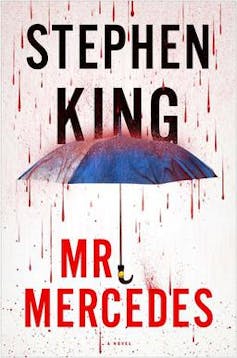Mr. Mercedes, Masturbation and Madness
- Written by Lauren Rosewarne, Senior Lecturer, University of Melbourne
 2017 has been a pretty excellent year for TV adaptations of books. Without pause, I’d enthusiastically recommend a Summertime binge on Strike, I Love Dick, Big Little Lies (which I wrote about here), The Handmaid’s Tale, and American Gods.
Alas, the ten-episode take on Stephen King’s Mr. Mercedes, doesn’t make this list.
King writes books that regularly meander. In his author notes to Lisey’s Story for example, he acknowledges frequently completely ignoring his editor’s recommendations on slashing. And while Lisey’s Story did feel repetitive in places, I like King enough to indulge him. The audiobook for my favourite King work, 11/22/63 – about the Kennedy assassination - was over 24-hours long but so captivating was it that I only narrowly avoided being hit by a motorcyclist while walking and listening.
The TV adaptation of 11/22/63 was solid. While I had initial hesitations about the casting of James Franco - in anything, truth be told, but most definitely this – it was good. It was well-paced and largely well-acted and I was invested enough to cry in the same scenes that I cried when listening to the book.
2017 has been a pretty excellent year for TV adaptations of books. Without pause, I’d enthusiastically recommend a Summertime binge on Strike, I Love Dick, Big Little Lies (which I wrote about here), The Handmaid’s Tale, and American Gods.
Alas, the ten-episode take on Stephen King’s Mr. Mercedes, doesn’t make this list.
King writes books that regularly meander. In his author notes to Lisey’s Story for example, he acknowledges frequently completely ignoring his editor’s recommendations on slashing. And while Lisey’s Story did feel repetitive in places, I like King enough to indulge him. The audiobook for my favourite King work, 11/22/63 – about the Kennedy assassination - was over 24-hours long but so captivating was it that I only narrowly avoided being hit by a motorcyclist while walking and listening.
The TV adaptation of 11/22/63 was solid. While I had initial hesitations about the casting of James Franco - in anything, truth be told, but most definitely this – it was good. It was well-paced and largely well-acted and I was invested enough to cry in the same scenes that I cried when listening to the book.
 The TV adaptation of Mr. Mercedes is a different beast all together.
Brendan Gleeson plays protagonist Bill Hodges, a retired detective with a very familiar malady: he’s unable to let go of that one last case, in this case, a perp, dressed as a clown, who mowed down a crowd of job-seekers.
Gleeson is frequently great: In Bruges and The Guard are two favourite films. This year however, I’ve also seen - and forgotten - him in the barely passable Hampstead and Trespass Against Us: two reminders that, like all of us, he can be inconsistent.
Gleeson however, isn’t the problem. The charm of King’s Mr. Mercedes – a charm I wrote about previously here – is the banding together of three completely unlikely characters whose paths serendipitously cross and who set out on a crime-solving adventure together. A ragtag posse that, alas, is largely gutted in the television show. Instead, excess emphasis is given to Bill’s relationship with the under-cooked Janey (Mary-Louise Parker). Most egregious, Bill’s rapport with his jike-talkin’, lawn’-mowin’ neighbour Jerome (Jharrel Jerome) is watered down to a vanilla shell of what it is in the book: my hunch is a misguided fear of a social media backlash.
The TV adaptation of Mr. Mercedes is a different beast all together.
Brendan Gleeson plays protagonist Bill Hodges, a retired detective with a very familiar malady: he’s unable to let go of that one last case, in this case, a perp, dressed as a clown, who mowed down a crowd of job-seekers.
Gleeson is frequently great: In Bruges and The Guard are two favourite films. This year however, I’ve also seen - and forgotten - him in the barely passable Hampstead and Trespass Against Us: two reminders that, like all of us, he can be inconsistent.
Gleeson however, isn’t the problem. The charm of King’s Mr. Mercedes – a charm I wrote about previously here – is the banding together of three completely unlikely characters whose paths serendipitously cross and who set out on a crime-solving adventure together. A ragtag posse that, alas, is largely gutted in the television show. Instead, excess emphasis is given to Bill’s relationship with the under-cooked Janey (Mary-Louise Parker). Most egregious, Bill’s rapport with his jike-talkin’, lawn’-mowin’ neighbour Jerome (Jharrel Jerome) is watered down to a vanilla shell of what it is in the book: my hunch is a misguided fear of a social media backlash.
 While there are dozens of detective stories better than this one - Strike, mentioned earlier, is a a great one - something that makes Mr. Mercedes worth talking about is the masturbation.
Mr. Mercedes isn’t really a whodunit, attributable to its early masturbation scene. After turning down the sexual advances of his mother, Brady (Harry Treadaway) sneaks upstairs to masturbate furiously. While we don’t quite know at this point that he’s the Mercedes Killer, we actually kinda do. Because masturbation on screen is often a clue to both madness and depravity.
In my book Masturbation in Pop Culture, I analysed hundreds of masturbation scenes. Rarely is masturbation - particularly so male masturbation - portrayed as the common stress-relieving, sleep-inducing, pleasurable pastime it is for most of us. Instead, it’s used to give insight into a character: a clue that they’re mad or bad. I recently suffered my way through the mind-numbingly boring Mindhunter: the exact same trope is used there too - one of the serial killers masturbates because he’s mad and bad. While females in film and TV get a little extra time to put on a sexy autoerotic performance for the audience - oftentimes in the bathtub - male masturbation is presumed not to offer such voyeuristic delights and thus functions frequently as a clue to deviance.
While there are dozens of detective stories better than this one - Strike, mentioned earlier, is a a great one - something that makes Mr. Mercedes worth talking about is the masturbation.
Mr. Mercedes isn’t really a whodunit, attributable to its early masturbation scene. After turning down the sexual advances of his mother, Brady (Harry Treadaway) sneaks upstairs to masturbate furiously. While we don’t quite know at this point that he’s the Mercedes Killer, we actually kinda do. Because masturbation on screen is often a clue to both madness and depravity.
In my book Masturbation in Pop Culture, I analysed hundreds of masturbation scenes. Rarely is masturbation - particularly so male masturbation - portrayed as the common stress-relieving, sleep-inducing, pleasurable pastime it is for most of us. Instead, it’s used to give insight into a character: a clue that they’re mad or bad. I recently suffered my way through the mind-numbingly boring Mindhunter: the exact same trope is used there too - one of the serial killers masturbates because he’s mad and bad. While females in film and TV get a little extra time to put on a sexy autoerotic performance for the audience - oftentimes in the bathtub - male masturbation is presumed not to offer such voyeuristic delights and thus functions frequently as a clue to deviance.
 Like lots of taboo presentations - menstruation is a good example, and one I’ve written a lot about - rarely show the thorough ordinariness of monthly bleeding: generally for one very good reason - such scenes don’t normally move a plot along. To justify including menstruation or masturbation therefore, the scenes need to be dramatic or do something to, or say something about a character: social suicide, sexual maturity, sexual perversion. Brady masturbates in Mr. Mercedes because his sexual appetites are off kilter and he’s a murderer. Ditto Jerry Brudos (Happy Anderson) in Mindhunter.
It’s fiction and I don’t consider any single media message as disproportionately potent in shaping our values. That said, the consequences of ignoring the normalness of masturbation in favour of the mad/bad trope subtly works as yet another way to establish norms regarding sex, in this case, that good and normal characters have intercourse while the bad ones resort to masturbation.
Like lots of taboo presentations - menstruation is a good example, and one I’ve written a lot about - rarely show the thorough ordinariness of monthly bleeding: generally for one very good reason - such scenes don’t normally move a plot along. To justify including menstruation or masturbation therefore, the scenes need to be dramatic or do something to, or say something about a character: social suicide, sexual maturity, sexual perversion. Brady masturbates in Mr. Mercedes because his sexual appetites are off kilter and he’s a murderer. Ditto Jerry Brudos (Happy Anderson) in Mindhunter.
It’s fiction and I don’t consider any single media message as disproportionately potent in shaping our values. That said, the consequences of ignoring the normalness of masturbation in favour of the mad/bad trope subtly works as yet another way to establish norms regarding sex, in this case, that good and normal characters have intercourse while the bad ones resort to masturbation.
Authors: Lauren Rosewarne, Senior Lecturer, University of Melbourne
Read more http://theconversation.com/mr-mercedes-masturbation-and-madness-84525





